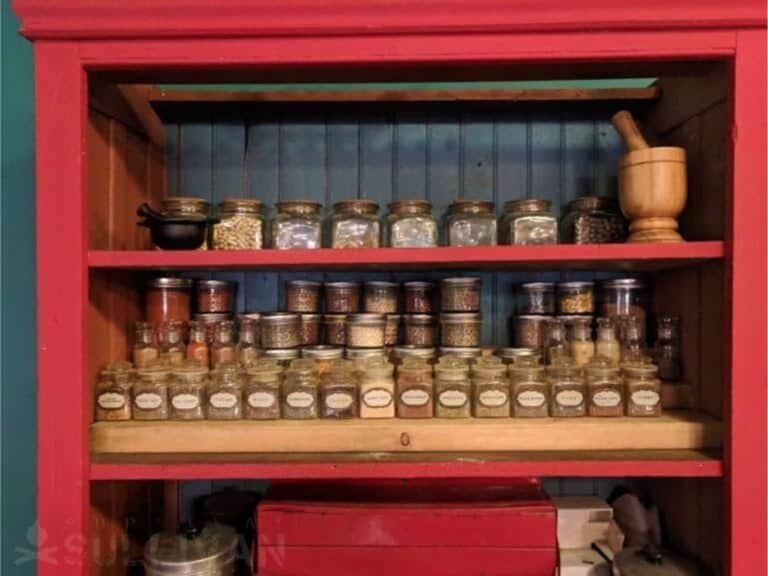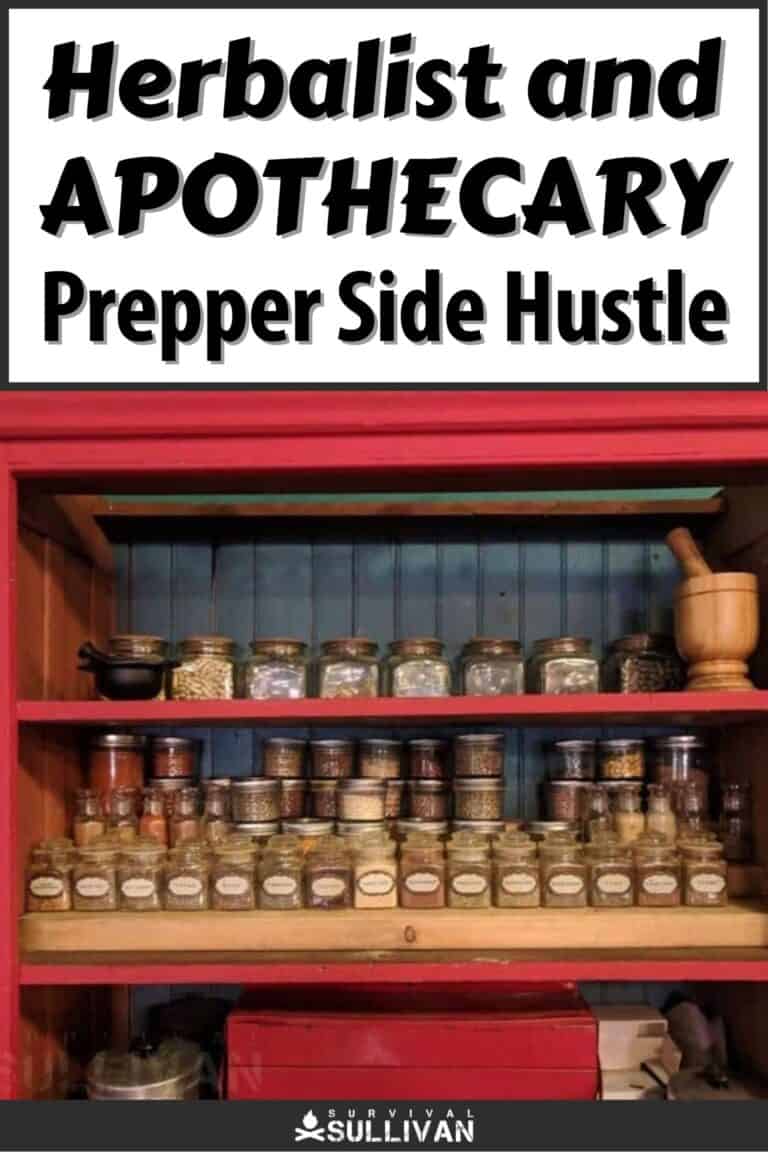The best type of prepper side hustles are the ones that are at least equally profitable now as they will be during a long-term disaster.

While money might be worthless during and after a SHTF event, bartering or trading of essential goods will always have value.
All preppers should have a plan for dealing with health and medical issues during a disaster when calling 911 will not be an option.
This is why many (likely most) prepping families stockpile not just first aid supplies and conventional medications, but also learn about natural remedies.
What Government Intrusion Exists For Herbalists And Apothecaries?
Although there are few restrictions and rules about what exactly a herbalist can do, some exist and can vary by state.
Some states do put stipulations on what type of credentials are needed to call a business or a store an apothecary.
In states that do regulate apothecaries like pharmacies, you could simply call your prepper side hustle an herb shop.
You do not need any type of license, credentials, or higher education to become a professional herbalist in any state.
But, you have to make certain that you never offer medical advice or claim that you are dispensing medication to customers – those types of actions are reserved exclusively for medical professionals.
What you can do is tell clients what specific herbs, roots, berries, bark, leaves, salves, tinctures, ointments, essential oils etc. have traditionally been used for, and what you personally use them for in your home.
The same rules apply to any type of homemade gel capsules you sell in your store.
Never advertise or otherwise state that the contents inside of the capsule are any type of medication or supplement – again, those types of activities are reserved exclusively for medical professionals and are highly regulated by the Food and Drug Administration.

What Is An Apothecary?
An apothecary is an old-fashioned term for a person who creates and dispenses (and most often grows) natural remedies for early doctors, surgeons, and the patients themselves.
In our modern world, it is the chemist or the pharmacist who fulfills this role in the medical industry.
In the 1800s, an apothecary would be filled with glass jars and bottles full of dried herbs, dried flower pieces, tree bark, dried roots, and berries.
Both the look and the supplies in a modern-day apothecary have changed little over the past several centuries.
While storing herbs and other apothecary items in plastic is now possible, most herbalists prefer to still use glass and metal tins to house their natural home remedy ingredients because most want them stored in an as natural and non-synthetic manner as possible.
What Do Herbalists Actually Do?
Herbalists commonly make and sell ointments, salves, dried flowers, dried herbs, tinctures, herbal infusions, herbal soaps, herbal teas, and herbal poultices.
Some herbalists also create and sell related products made with all-natural ingredients such as candles, wax melts, herbal shampoos and conditioners, and even all-natural herbal cosmetics.
Why Become an Herbalist?
During and likely after a long-term disaster, herbalists will once again be on the front line of a community’s health needs.
The type of disaster that occurs will dictate how it will take for a pharmacy to run dry and for hospital service to crumble … and ultimately be restored.
When someone becomes ill, injured, or in need of a natural replacement for a prescription, a herbalist will have ample services and supplies to barter.
During normal times, herbalists can earn a substantial prepper side hustle income or eventually a full-time salary selling the same items as noted above to folks who want to treat and prevent health issues naturally – as well as candles, soaps, toiletries, and cleaning supplies composed of only herbal and natural ingredients.
Some folks turn to herbalism because of a health scare, concerns about the synthetic ingredients in modern medicine and potential side effects, and other self-reliant folks who want to learn how to use the natural resources around them to take care of their families during an emergency situation.
Whether you start small or go big with the apothecary side hustle, taking into account what herb and apothecary supplies you can grow yourself seasonally or year-round will help you factor in your start-up and replenishments costs.
Not all herbalists or apothecary operators are also gardeners, but it makes the flow of supplies simpler, cheaper, and far more sustainable.
The more versatility your apothecary plans are during normal times, the more money you should stand to make.
Selling herbal soaps, candles, bath salts, and other common household and beauty items will extend your product offerings beyond only selling the likes of dried flowers and herbs or products made from them.
Creating a clear focus for your herbal and apothecary business both now and during a SHTF event will help you develop a successful strategy, business plan, and budget for the new prepper side hustle.
Your apothecary may evolve or broaden its offerings over time as you perfect your herbal salve recipes, harvest more healing herbs, etc.
You can choose to be an herbalist that does not necessarily work with clients either locally or online.
Instead, you could focus on herbal farming and be a supplier of goods to other herbalists, teach herb classes in person or online, or do all of the above in addition to running an apothecary as your skills, business experience, and client base increase.

How To Become A Professional Herbalist
In America, there is no hierarchy to being an herbalist from a for-profit professional standpoint.
Schools that teach herbalism are not credentialed by any typical college or university-style entity.
If a person calls themselves a “certified herbalist” or a “master herbalist it is either a self-designation from years of experience or training or because they took possibly wonderful but not formally accredited courses that offered a certificate with such a label for students who successfully complete the class.
The American Herbalist Guild (AHG) offers a peer review process for students so they can “earn” the level and label of being a “registered” herbalist.
Students who pass the peer review process are then entitled by the herbalist learning center to put a RH, or AHG after their name as a title.
The Herbal Academy may also offer certificates of completion for their online coursework in herbalism.
Even though you will need to achieve licensure by taking herbal classes, the more you learn the more you may earn.
Showcasing your dedication to learning herbalism and perfecting your skills is not only great marketing for your apothecary but also can help instill confidence in customers.
Some great herbalist authors and books to read to both help you get started and further your apothecary shop I recommend include:
Authors
- Rosemary Gladstarr
- David Hoffman
- Jamie Schmotzer
- James Green
- Anne MckIntyre
- Stephen Harrod Buhner
- Maria Noel Groves
Books
- The Complete Herbal Tutor
- Modern Herbal Dispensatory
- Herbal Handbook for Homesteaders
- Homesteader’s Herbal Companion
Skills All Herbalists and Apothecary Shop Owners Should Have
- All herbalists should embrace the holistic perspective on our health and understand what that means if launching an herbalism or apothecary business.
- He or she should also possess a mastery of plant identification of specific plants and know how to effectively and safely use them.
- Be astute record keepers and remain well aware of all legal restrictions of working in the herbalism field as it pertains to the dispensing of medical advice, treatments, “medicine”, or the diagnosing of health conditions.
- Although no continuing education is required for a herbalist, you should strongly embrace working with a mentor.
- A diligent herbalist or apothecary shop owner should also create a journal to record and alter or expand past recipes and supplies you used to “treat” an issue.
- Take online or in-person classes and workshops to keep learning new things, no matter how many years of experience you have in the herbalism realm.
Most Common Herbalism And Apothecary Tools And Supplies
There are no major start-up costs to garner the tools of the herbalism trade.
While you can spend hundreds to even thousands of dollars purchasing herbs, dried flowers, essential oils, etc. you do not need fancy or modern specialized equipment to ply your new prepper side hustle trade.
- Glass or Enamel Saucepan – A saucepan of this type will come in quite handy for making decotions, herbal steams, and electuary syrups. A metal pot can be used for some things an herbalist does, but can react negatively to many herbal preparations.
- Crockpot – Some herbalists (myself included) use a crockpot to make herbal infusions to vastly speed up the “place in a window and shake daily for weeks” process.
- Cheesecloth – Stock up on cheesecloth and always wash it out and allow it to dry so you can use it multiple times to strain herbal recipes through. White all-cotton T-shirts can work decently in a pinch, but cheesecloth is better.
- Tea Kettle – You can boil water in your saucepan, but a tea kettle is quite handy for doing large batches of a recipe – especially thanks to the pouring spout and easy-to-hold handle.
- Mason Jars – You simply cannot purchase enough canning jars, rings, and lids to store herbal products in or to sell products you created to customers.
- Vacuum Sealer – A vacuum sealer machine will allow you to use airtight bags to store herbal products in for storage or selling and also offers an attachment to seat lids to canning jars sans a ring – a money saver in the long run.
- Mesh Strainer – A fine mesh strainer will be one of your most used tools in any apothecary. You will frequently be straining infusions, extracts, oils, and teas through the cheesecloth placed on top of a mesh strainer when working as an herbalist.
- Wooden Spoon – You will often use a wooden spoon, spatual, or slotted spoon to stir recipes. Some folks prefer silicone spoons and utensils – which work equally well.
- Small Funnel – A small funnel will be a wonderful addition to your new apothecary. Filling jars, chapstick containers, etc. will be accomplished with less mess and waste when a small funnel is used.
- Amber Jars and Bottles – Although they are increasingly difficult to find and not cheap, amber jars and bottles are superb for storing herbal creations inside. The amber-colored glass helps to prevent light from reaching the contents inside, which in turn extends both their shelf life and their potency.
How Many Herbs Do You Need To Start An Apothecary
How many herbs you decide to grow and preserve or purchase will depend upon your budget and allowable space for the herb shop.
As a general rule, you need just three to four ounces of an herb to make several recipes or tubs of salve – and still have a little left over.
If your budget allows, order enough of each herb you plan to routinely use to last six months – that should get you through to the next growing season.
Do not forget to factor carrier oils, honey, glycerin, vinegar, beeswax, and high-proof alcohol like Vodka into your set-up budget because those are all commonly used base or active ingredients in a plethora of herbal recipes.
Turning a passion for herbalism or a desire to help your family prepare for health issues during a SHTF disaster is a prepper side hustle that will not only make you money – but could save your life or the life of someone you love.

The post Herbalist and Apothecary Prepper Side Hustle appeared first on Survival Sullivan.
By: Tara Dodrill
Title: Herbalist and Apothecary Prepper Side Hustle
Sourced From: www.survivalsullivan.com/apothecary-prepper-side-hustle/
Published Date: Tue, 28 Feb 2023 00:00:00 +0000
-------------------------------------------------------------------------
Did you miss our previous article...
https://outdoorsnewswire.com/survivalist/the-29-best-tactical-backpacks
 CampingSurvivalistHuntingFishingExploringHikingPrivacy PolicyTerms And Conditions
CampingSurvivalistHuntingFishingExploringHikingPrivacy PolicyTerms And Conditions
